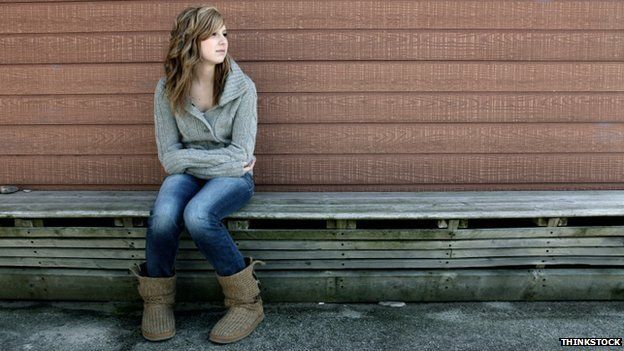Coronavirus and schools: Ditch truancy fines, say doctors
- Published

As the first pupils in England return to school, psychiatrists say truancy fines should be dropped amid a Covid-related spike in mental health issues.
More than 250 psychiatrists have written to the education secretary saying a forced return to school will hit pupils with anxiety hard.
Pupils in Leicestershire and Leicester are the first to return to regular school since schools shut in March.
Some of these areas were under local lockdown restrictions until recently.
Earlier this summer, Education Secretary Gavin Williamson said that parents who did not send their children to school in September would be penalised with truancy fines.
School attendance during the summer term, for those pupils who were in year groups that were allowed to return to lessons, had remained optional, with parents reassured by the government that the usual truancy fines would not be applied.
The threat of fines, which aims to get all children back in school, was criticised for not taking account of families who have members shielding from coronavirus.
There have also been concerns about the impact of the pandemic and lockdown measures on the well-being of children, who may have lost relatives to Covid-19.
'Catastrophic thoughts'
Tamsin Ford, professor of child and adolescent psychiatry at Cambridge University, said: "I'd be extremely surprised if we don't have a spike in the number of children who - for mental health reasons, particularly anxiety - find it very difficult to go back to school regularly or at all."
She described how those suffering from anxiety can have terrifying thoughts that prevent them from functioning in a normal way.
"Catastrophic thoughts like 'I'm going to die' or 'I am going to collapse' or 'if I do this, then something dreadful will happen'.
She added: "Sometimes concerns about family members who might be ill or shielding or vulnerable can trigger really, really terrifying thoughts that can have a physical impact as well.
Anxiety could lead to diarrhoea, vomiting, stomach cramps and other conditions that make it difficult to function physically and attend schools, she added.
She said: "Services have seen far more children in crisis, there's far less support around and we do know there are far more families under financial and other stresses."
The letter, organised by the Royal College of Psychiatrists, warns that although many families will be relieved that pupils are returning to school, for others "it could be a significant source of anxiety".
'Spot the signs'
"As child and adolescent psychiatrists, we have seen the devastating impact the Covid-19 crisis has had on the mental health of many young people," says the letter.
"This is at a time when the lockdown and social distancing has made it even harder for them to access mental health support.
It adds: "The threat of fines could force parents of children who feel anxious to send them back to school even if they're not ready.
"This could have serious consequences on their mental health, especially if they are worried about family shielding."
A spokesman for the Department for Education said: "Schools should work with families to ensure children are attending full time from September. As usual, fines will sit alongside this, but only as a last resort and where there is no valid reason for absence."
Speaking as he launched the DfE's Wellbeing for Education Return programme, Mr Williamson said: "This pandemic has impacted people in different ways, particularly young people dealing with the disruption of the last few months, but also our dedicated teachers and education staff."
'Co-operation needed'
The programme works in part by recruiting mental health experts to deliver training to nominated school staff.
It aims to help staff spot the signs of when children are struggling.
Paul Whiteman, general secretary of the National Association of Head Teachers, said fines were too blunt an instrument to use while coronavirus is still a concern.
He said fines "drive a wedge between schools and families at the best of times".
"That is something we can ill-afford when the priority is to get more pupils back into class.
"Achieving this will rely on a huge amount of co-operation and understanding between schools and families," he added.